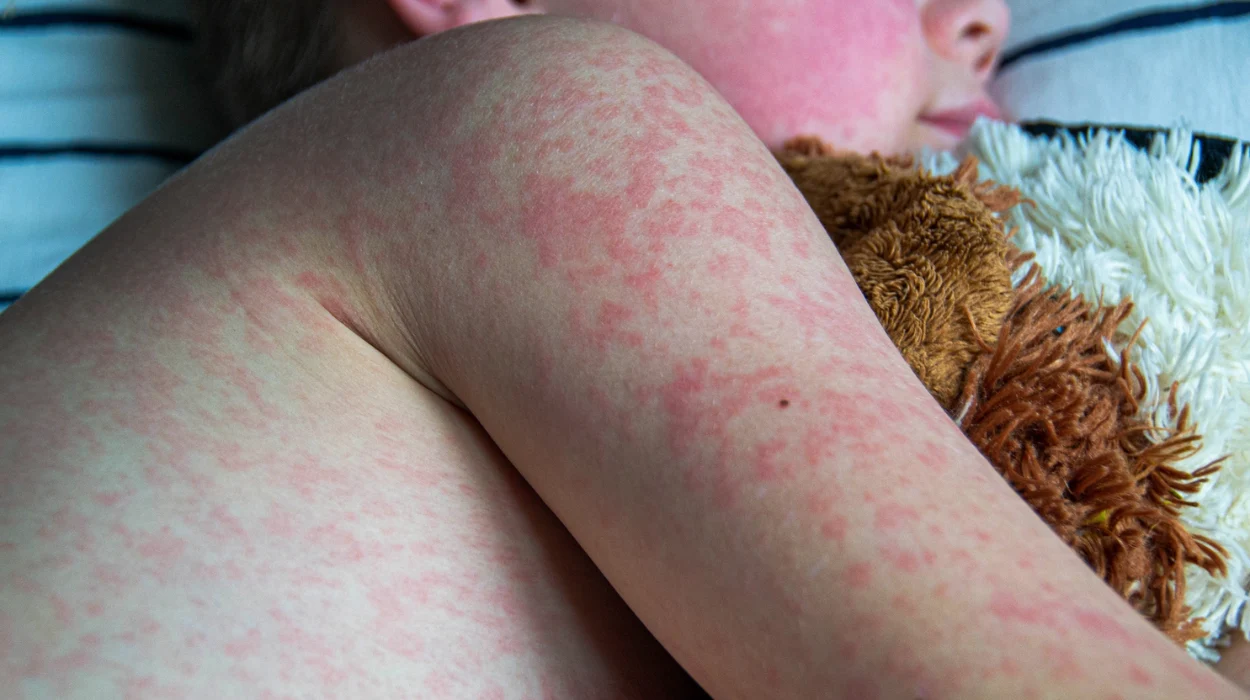UK (Parliament Politics Magazine) – Experts warn measles could cause hundreds of deaths if UK vaccination rates keep falling, with major outbreaks expected.
As reported by The Independent, a leading health expert has warned that hundreds could die from measles in the next 20 years if vaccination rates remain low.
What did experts warn about measles?
Imperial College London modelling indicates that infants under one who are not vaccinated could account for a significant share of 480 preventable measles deaths projected over the next two decades.
Katherina Hauck of the Jameel Institute said that even with vaccination coverage at about 90 percent, two major outbreaks could still occur, adding an estimated 390,000 cases.
Around 85% of the population has completed the two-dose schedule needed for protection against the highly infectious disease.
A child died, and several others were left in serious condition at Liverpool’s Alder Hey Children’s Hospital following measles infections. Health officials issued a warning amid concerns over unvaccinated patients.
The Royal College of Paediatrics and Child Health warned that falling vaccination rates in Britain are “extremely concerning.” They urged the government to act quickly to halt the decline.
Researchers said hospitalisations and productivity losses from measles could cost the UK up to £290 million over the next 20 years.
The projections are based on a worst-case scenario, assuming no rise in vaccination uptake and no measures taken during an outbreak.
The study assumed that 3 per cent of those unvaccinated are anti-vaccine. But officials said most cases are linked to poor access or low parental priority rather than outright opposition.
Measles has caused fewer than five deaths a year since 1989. However, experts warn cases could rise if vaccination rates fail to improve.
Steve Turner’s views on the doctors’ concern over falling vaccination rates
Professor Steve Turner, from the Royal College of Paediatrics and Child Health, warned that urgent action is needed to raise vaccination rates.
He added,
“It [measles] poses a significant risk to everyone, puts immense strain on already struggling health services, and also our economy. Paediatricians are particularly concerned about current measles outbreaks in the UK; measles can be safely prevented by vaccination.”
What did Dr Vanessa Saliba say about the UK measles outbreaks?
Dr Vanessa Saliba said the UKHSA’s 2023 projections are still valid because vaccination rates remain low.
She stated,
“You can argue on the size of the outbreaks, we all agree you are going to see outbreaks. It’s not a surprise what we’re seeing at the moment, so it’s very important we work as a system to reverse that trend… If vaccine coverage is below 95 per cent, we will see cases, outbreaks, and potentially deaths.”
Ms Saliba said Britain has never met the WHO’s measles vaccination targets, so recent outbreaks were to be expected. The agency has now moved the MMR jab to 18 months instead of three years to boost uptake.
UKHSA’s stance on London’s measles risk
The UK Health Security Agency warned in 2023 that London could face an outbreak of 40,000 to 160,000 measles cases. Vaccination uptake, then at 74 per cent for both doses, would need to rise to prevent it.
The most recent data, covering January to March 2025, shows vaccination uptake in London has slipped again to just 70 per cent.
NHS England launched a nationwide drive in 2023-24 for children who had missed the MMR vaccine, leading to 180,000 additional doses being administered.
The UKHSA warned that Imperial College modelling should be interpreted with caution, as it assumes no public health response after an outbreak, a scenario officials say is unlikely.
Professor Hauck’s views on vaccine hesitancy in Britain
Professor Hauck said low vaccination rates are linked to limited access to primary care and the spread of misinformation.
She stated,
“Past medical accidents and poor communication of the benefits of vaccination have also caused vaccine hesitancy to spike in some areas, including parts of Britain.”
She said helping measures include awareness campaigns, better vaccine access, and building trust in officials.
Professor Hauck also suggested discussing mandatory vaccinations and taxing people who do not get vaccinated, like in other countries.
Professor Majeed’s views on low vaccination coverage
Professor Azeem Majeed, from Imperial College, said the modelling highlights the serious public health risks of low vaccination coverage.
He said,
“In a ‘no change’ scenario, with coverage at around 90 per cent, the population is vulnerable to large-scale outbreaks every few years, as the number of susceptible individuals builds up over time, and the main message to be taken is the need for sustained high vaccine coverage.”
Mr Majeed stated that the total number of cases would depend on modelling assumptions, adding that government and NHS responses would limit infections and deaths.
What did MMR figures reveal about England’s vaccination gap?
Measles Mumps and Rubella vaccine uptake in England is 85.6 per cent for the first dose at age two, and 85.5 per cent for the second dose at age five.
The current uptake is below the WHO’s recommended 95 per cent threshold needed for measles elimination.
Key facts about measles patients in the UK
Since January 2025, most measles cases in England (69%) were in children under 10. Nearly half were in London, with rises since April. In four weeks before July, 96 new cases appeared, mainly in London and the North West.


